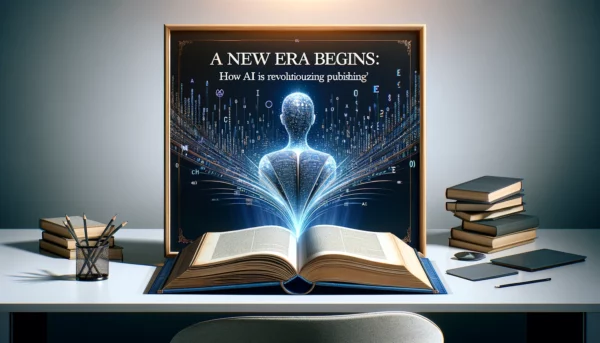In recent years, Artificial Intelligence (AI) has emerged as a groundbreaking force across various sectors, reshaping how we approach and execute tasks that were once solely human-driven.
Among these evolving landscapes, the book publishing industry stands out as a notable beneficiary of AI’s advancements. AI-powered publishing tools have infiltrated this traditionally artistic domain, offering new possibilities and transforming the very fabric of how books are written, edited, and marketed.
The impact of AI in book publishing is multifaceted and profound. From streamlining the editing process to customizing marketing strategies, AI is not just an auxiliary tool but is becoming a central component in the publishing ecosystem.
These innovations are not only optimizing existing processes but are also unlocking new creative potentials, enabling writers and publishers to explore uncharted territories in storytelling and audience engagement.
As we delve deeper into the digital era, AI’s role in book publishing is rapidly shifting from a novel technology to an indispensable asset, heralding a new era of efficiency, creativity, and precision in the industry.
AI-Powered publishing Tools
The landscape of AI-powered tools and AI writing tools in the publishing sector is diverse and dynamic, addressing various stages of the publishing process. From AI writing tools that can be used to create content to grammar checkers, these tools are designed to enhance efficiency, improve content quality, and streamline the publishing workflow.
- Grammarly: An AI-powered writing assistant that helps with grammar checking, style editing, and enhancing the overall quality of written content.
- OpenAI’s GPT-3: A state-of-the-art language processing AI tool used for generating human-like text, aiding in writing and high-quality content generation.
- Hemingway Editor: An application that focuses on improving the clarity and readability of text, making it bold and clear.
- Scrivener: A writing software that offers extensive tools for organizing and structuring complex writing projects, widely used by authors and screenwriters.
- Yoast SEO: A popular WordPress plugin that uses AI to provide SEO guidance, helping writers optimize their web content for search engines.
- Hootsuite Insights: This AI tool offers social media content analysis and suggestions, helping to tailor content to the audience’s preferences.
- MarketMuse: An AI-powered content research and optimization tool that helps in planning and creating content that aligns with SEO best practices.
- DeepL Translator: An AI tool renowned for its high-quality translations, making content accessible to a wider, global audience.
- BuzzSumo: Uses AI to analyze content trends and provides insights into popular content and emerging topics across various social media platforms.
- Jasper (formerly Jarvis): An AI tool that helps in generating high-quality content for various purposes. From blog posts to advertising copy, it can be used to create content for a range of applications.
- Ubersuggest: An AI-driven keyword research tool that offers insights into keyword trends, competition, and SEO optimization opportunities.
Natural Language Processing (NLP) in Publishing
Natural Language Processing (NLP), a subfield of AI technology, plays a crucial role in the burgeoning landscape of AI-powered publishing tools. At its core, natural language processing involves the application of computational techniques to the analysis and synthesis of natural language and speech.
In the context of book publishing, NLP serves as the backbone of many AI tools, enabling them to process, understand, and even generate human-like text.
Enhancing Language Understanding with NLP
One of the primary functions of NLP in publishing is to facilitate a deeper understanding of language. This involves not just recognizing words and their meanings, but also grasping the nuances, tone, and context within a text.
Such comprehension is vital in editing and proofreading stages, where NLP-driven tools can identify grammatical errors, suggest stylistic improvements, and ensure that the text adheres to language norms.
This capability is particularly beneficial for writers whose first language is not English or for those who need assistance in refining their writing to professional standards.
NLP in Content Generation and Idea Development
Beyond mere text analysis, NLP is also instrumental in generating human-like text. This aspect of NLP comes into play in AI writing assistants, which can draft content based on specific guidelines or themes.
These tools use NLP to understand a given topic or style and then produce text that aligns with those parameters. This feature is especially useful for generating initial drafts, brainstorming content ideas, or even composing short passages that writers can then expand upon.
NLP’s Contribution to High-Quality Content and Engaging Narratives
The most significant application of NLP in publishing is its role in creating high-quality content and engaging narratives. By analyzing vast datasets of literary works and reader feedback, NLP-enabled tools can offer insights into storytelling elements that resonate most with audiences.
This includes identifying popular themes, narrative structures, and character archetypes. Armed with this knowledge, writers can craft their work in ways that are more likely to engage and captivate readers.
Your Publishing Journey Awaits – Start NowNLP Fostering Creativity in Writing
Moreover, NLP’s ability to process and generate language creatively opens new avenues in experimental and collaborative writing. For instance, AI programs powered by NLP can suggest plot twists, dialogue, or character developments, providing writers with fresh perspectives and inspiration.
This symbiosis of human creativity and AI’s analytical prowess fosters a unique creative process, leading to the creation of narratives that are both innovative and relatable.
The Role of AI Tools in Enhancing Content Quality
In the dynamic world of book publishing, the quality of content is paramount. AI tools, with their advanced capabilities, play a pivotal role in ensuring that the content not only meets but often exceeds the high standards expected in the industry.
These tools, powered by sophisticated algorithms and machine learning, provide a range of functionalities that significantly elevate the quality of written content.
Grammar and Style Enhancement through AI
One of the fundamental ways these tools enhance content quality is through meticulous grammar checking. Unlike basic spell-checkers, AI-driven grammar tools delve deeper into the intricacies of language.
They can detect and correct complex grammatical errors, ensure proper sentence structure, and even suggest stylistic improvements. This level of detailed analysis helps in refining content to a polished and professional standard, which is particularly beneficial for maintaining the clarity and readability of the text.
SEO Optimization and Audience Reach
SEO (Search Engine Optimization) optimization is another crucial area where these tools are making a substantial impact. In the context of online content, such as e-books, blogs, and digital marketing materials for books, being discoverable by search engines is vital.
AI-powered tools aid in optimizing content by analyzing keywords, assessing search trends, and suggesting changes that can improve search engine rankings. This not only helps in reaching a wider audience but also ensures that the content aligns with what potential readers are searching for.
Maintaining Narrative Consistency with AI
Maintaining a consistent and engaging writing style is also crucial, especially in book publishing where the narrative voice is key to the reader’s experience. AI tools can analyze an author’s writing style and provide suggestions to ensure consistency throughout the text.
This is especially useful in cases of collaborative writing or in situations where different sections of a book are written at different times. By maintaining a uniform tone and style, AI helps in preserving the integrity and coherence of the narrative.
Machine Learning in Content Improvement
Furthermore, machine learning algorithms are at the heart of content improvement when using AI tools. These algorithms are capable of learning from vast datasets of published materials and reader feedback, allowing them to provide insights into what makes content successful.
They can suggest structural changes, point out areas that might require more development, and even propose thematic enhancements. This aspect of AI is not just about correcting errors but is geared towards actively improving the substance and appeal of the written content.
Creative Writing and AI: A Symbiotic Relationship
The integration of Artificial Intelligence (AI) into the realm of creative writing marks the beginning of a symbiotic relationship between technology and human creativity. AI’s contribution to the creative writing process is multifaceted, ranging from providing inspiration to overcoming common challenges faced by writers.
Overcoming Writer’s Block with AI
One of the most significant ways AI aids in the creative writing process is by helping writers overcome the dreaded writer’s block. This typically occurs when writers find themselves at a loss for ideas or unable to progress in their narrative.
AI-powered tools can step in during these moments, offering prompts, suggesting plot developments, or even generating sample passages. These prompts are not meant to replace the writer’s own creativity but rather to spark new ideas and perspectives that the writer can develop and make their own.
AI in Narrative and Character Development
AI’s role in generating content ideas extends beyond just overcoming writer’s block. It includes the development of entire narratives, characters, and settings. AI tools, using data from a vast array of literary sources, can suggest unique and diverse story elements, helping writers to explore uncharted thematic territories or add depth to their narratives.
For instance, an AI tool might suggest an unexpected twist in a storyline or propose character traits that add complexity to the narrative.
AI in Digital Content Creation
Beyond traditional book writing, AI tools are also instrumental in composing other forms of written content. In the realm of digital content creation, such as blog posts and social media captions, AI’s impact is increasingly evident.
For blog posts, AI can assist in structuring the article, generating SEO-friendly headlines, and even suggesting key points to cover based on trending topics and keywords.
This ensures that the content is not only creatively engaging but also optimized for digital platforms.
AI for Social Media and Long-form Content
In the case of social media, where brevity and impact are key, AI tools are adept at crafting captivating captions that resonate with the target audience.
By analyzing successful patterns in social media engagement, these tools can suggest phrasing and content styles that are more likely to encourage interaction and sharing.
For longer forms of content, such as novels or extensive research articles, AI writing software can assist in organizing complex narratives, ensuring coherence in plotlines, and maintaining consistency in character development.
AI tools can analyze the entire manuscript, providing feedback on pacing, narrative structure, and even thematic consistency.
The Content Creation Process Revolutionized
The advent of Artificial Intelligence (AI) has revolutionized the content creation process, introducing a paradigm shift from traditional methods to more technologically advanced approaches.
This transformation is evident at every stage of content generation, from initial drafting to the final stages of publishing, making the process more efficient, accessible, and adaptable to the needs of a diverse range of creators.
AI in the Drafting Stage
At the drafting stage, AI plays a crucial role in assisting creators to develop their initial ideas into structured content. AI-powered writing tools are capable of suggesting outlines, generating content based on specific prompts, and even offering narrative or thematic ideas.
This early intervention by AI not only speeds up the drafting process but also helps in overcoming common challenges such as writer’s block or lack of inspiration.
Development and Refinement of Content with AI
Moving beyond drafting, AI tools continue to aid in the development and refinement of content. These tools employ advanced algorithms to analyze text for coherence, readability, and engagement.
They offer suggestions for improvement, such as rephrasing awkward sentences, enhancing vocabulary, and ensuring that the content maintains a consistent tone and style.
This level of analysis, which would be time-consuming and labor-intensive for human editors, is accomplished swiftly and efficiently by AI, ensuring that the content is polished and ready for the next stages.
AI in Editing and Proofreading
In the editing and proofreading phases, AI tools are invaluable in detecting and correcting grammatical errors, spelling mistakes, and punctuation issues.
They can also perform more complex tasks like checking for factual accuracy, consistency in details, and even adherence to specific formatting guidelines. This meticulous attention to detail ensures that the final content is not only error-free but also of a professional standard.
Your Publishing Journey Awaits – Start NowAI’s Role in Publishing
When it comes to publishing, AI tools continue to play a significant role. They can assist in formatting the content for different platforms, whether it’s a print book, an e-book, a blog post, or a social media update.
AI-driven analytics can also guide creators in understanding the best times and platforms for publishing their content to achieve maximum reach and engagement.
User-Friendly Interfaces of AI Writing Tools
One of the most notable aspects of AI in content creation is the user-friendly interfaces of AI writing tools. These tools are designed to be accessible to a wide range of users, from professional writers to novices.
Their intuitive design and easy-to-navigate features make AI tools approachable for individuals who might not have technical expertise.
Many AI writing tools are also available as web-based applications or integrations with popular word processors, making them readily accessible to anyone with an internet connection.
Targeting the Right Audience with AI
In the increasingly competitive landscape of content creation, reaching and engaging the right audience is paramount. AI tools have become instrumental in this aspect, offering sophisticated capabilities to identify and target specific audience segments effectively.
These tools leverage data-driven insights and machine learning algorithms to understand audience preferences, behaviors, and needs, ensuring that content is not only well-crafted but also resonates with its intended readers.
Advanced Keyword Optimization with AI
One of the key ways AI assists in audience targeting is through advanced keyword optimization. In the digital space, keywords play a crucial role in connecting content with its target audience.
AI tools analyze search trends, keyword relevance, and user search behavior to identify the optimal keywords for a piece of content.
This process involves not just the selection of high-traffic keywords but also understanding the intent behind these searches. By optimizing content with the right keywords, AI ensures that it reaches the most relevant audience, increases visibility in search engine results, and drives more engagement.
Understanding and Predicting Content Needs
Beyond keyword optimization, AI’s capabilities extend to understanding and predicting relevant content needs. AI tools can analyze large datasets, including social media interactions, user feedback, and engagement metrics, to glean insights into what type of content is resonating with specific audience groups.
They can detect emerging trends, shifts in consumer interests, and gaps in existing content offerings. This analysis enables content creators to tailor their work to address the current and evolving needs of their audience, increasing the relevance and impact of their content.
Audience Segmentation and Personalized Content Strategies
AI also plays a crucial role in segmenting audiences based on various criteria such as demographics, interests, and online behavior. This segmentation allows for more targeted and personalized content strategies.
For instance, AI can help identify a subgroup within an audience that shows a particular interest in a specific genre or topic, enabling creators to tailor their content to appeal directly to this group.
Predictive Analytics for Future Content Trends
Moreover, AI-driven predictive analytics can forecast future content preferences and trends, providing creators with a proactive approach in planning and developing their content. This foresight allows for the creation of content that not only meets current audience needs but is also poised to engage future interests, keeping creators ahead of the curve.
The Future of AI in Publishing
As we look towards the future, the intersection of AI and book publishing is ripe with potential for groundbreaking advancements. The evolution of AI technology promises not only to enhance current practices but also to introduce new paradigms in how books are written, published, and consumed. However, with these advancements come both challenges and opportunities that will shape the future landscape of publishing.
Your Publishing Journey Awaits – Start NowPersonalized Content Creation with AI
One of the most exciting prospects is the further development of AI in personalized content creation. AI could evolve to not only assist in writing and editing but also in creating customized narratives based on reader preferences.
Imagine a scenario where a book’s storyline, characters, or themes could adapt in real-time, aligning with the reader’s interests or reading habits. This could revolutionize storytelling, making it a more interactive and personalized experience.
Predictive Analytics and Market Forecasting
Another advancement could be in the realm of predictive analytics, where AI becomes even more adept at forecasting market trends and reader preferences. This would enable publishers to make more informed decisions about which books to publish, how to market them, and even predict future bestsellers with greater accuracy. Such capabilities would significantly reduce financial risks and optimize resource allocation in the publishing process.
Global Reach and Language Accessibility
AI is also set to enhance the global reach of books. With advancements in language processing and translation algorithms, AI could enable instant, high-quality translations of books, making them accessible to a wider, global audience. This would not only increase the market for publishers but also enrich cultural exchanges through literature.
Navigating Ethical Implications and Employment Concerns
However, these advancements are not without their challenges. One of the primary concerns is the ethical implications of AI in publishing.
As AI becomes more involved in content creation, issues around authorship, creativity, and intellectual property rights become increasingly complex. There is a need to establish clear guidelines and ethical standards to address these concerns.
Addressing Data Privacy and Security Issues
Another challenge is the potential impact on employment within the publishing industry. As AI tools become more sophisticated, there is a risk of job displacement in areas such as editing, proofreading, and even marketing. The industry will need to navigate these changes carefully, ensuring a balance between leveraging AI capabilities and preserving the invaluable human expertise that drives the essence of publishing.
The integration of AI also raises concerns about data privacy and security. As AI systems rely heavily on data to function effectively, ensuring the privacy and security of this data is paramount. Publishers will need to invest in robust security measures to protect sensitive information and maintain reader trust.
Final thoughts
As we stand on the brink of a new era in publishing, the integration of Artificial Intelligence (AI) into the field marks a significant milestone in the evolution of content creation.
From AI writers like GPT-3 to sophisticated editing tools like Grammarly, the landscape of publishing is undergoing a transformative shift, driven by technological advancements that were once the realm of science fiction.
These tools, with their ability to generate human-like text, optimize for SEO, and offer personalized content strategies, are not only enhancing the efficiency and quality of content but also redefining the creative process itself.
The influence of AI extends beyond mere automation; it is about augmenting human creativity, offering new ways to overcome traditional challenges like writer’s block, and opening up unprecedented avenues for storytelling and audience engagement.
With applications ranging from natural language processing to predictive analytics, AI is enabling a more data-driven, responsive, and targeted approach to content creation.
However, this journey is not without its challenges. Ethical considerations, the balance between human input and machine automation, and the need to maintain the authentic voice of the writer are areas that require careful navigation.
As the industry continues to adapt to these changes, the focus must remain on leveraging AI as a tool to complement and enhance human creativity, rather than as a replacement.
The future of AI in publishing is vibrant and promising. It offers opportunities to push the boundaries of what is possible in content creation and distribution, making literature and written content more accessible, engaging, and tailored to the needs of a diverse global audience.
As AI continues to evolve, its role in shaping the landscape of publishing will undoubtedly expand, opening new horizons for authors, publishers, and readers alike.
The story of AI in publishing is just beginning, and it is poised to be an exhilarating narrative of innovation, creativity, and transformation.







